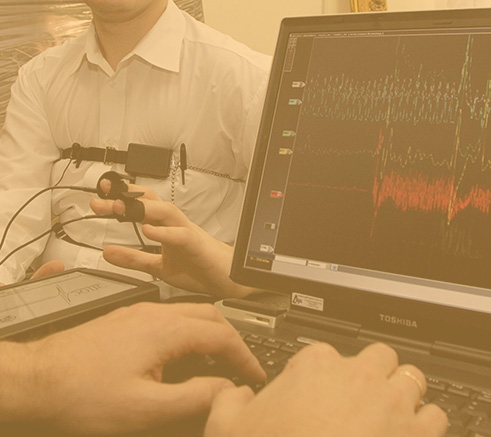Polygraph Testing in Sex Addiction Recovery: A Foothold for Rebuilding Trust, Affirming ‘Gut’ & Fostering Accountability
When asked about the most painful part of being sexually betrayed, most partners of sex addicts will answer, without hesitation, “the lies.” For many, the lies outrank the sexual wrongdoing in terms of damage to the relationship and the personal impact.
The truth will never hurt as much as the exposure of a lie.
– Unknown
One reason the lies cut so deeply is that they punctuate the betrayal as deliberate, calculated, covert, purposeful, negligent — and personal. No matter how many times a recovering addict or well-meaning therapist may accurately say, “the acting out had nothing to do with you,” it is difficult to internalize this idea when the pain is experienced as one hundred percent personal.
Betrayal, after all, is a violation of trust perpetrated by someone you are attached to; and in the case of a spouse, it is perpetrated by someone who openly vowed to love, protect, cherish and be faithful to you. It isn’t surprising then that 69% of partners1 experience trauma in the wake of discovering they have been deceived by the very person they expected to be able to trust the most, or that 57% describe the betrayal as “the most traumatic event of [their] life.”2
For there to be betrayal, there would have to have been trust first.
– Suzanne Collins
Sexual betrayal and deceit are incredibly destabilizing to one’s sense of self and security, and can cause one to question everything, including one’s own perception of reality or ‘gut’. Research has also shown that betrayal trauma is associated with more physical symptoms3 and mistrust4 than other types of traumas. Consequently, establishing safety and trust are essential if the relationship is to have any chance of surviving and if the partner is to heal. Because betrayal wounds go deep into the human psyche, healing interventions must address trust wounds on an equally deep level.
When prepared for in a thoughtful, therapeutically-minded manner, polygraph testing is one type of rigorous intervention that is helping a growing number of couples gain a foothold of trust and accountability in early recovery.

A polygraph test is a procedure that uses computerized equipment to measure physiological responses during the course of an interview, usually consisting of two to four questions about past behavior and/or a prepared disclosure document. Tests are conducted by a trained polygraph examineri who understands how to administer and analyze polygraph data and who adheres to strict ethical standards set forth by the American Polygraph Association.
Today, polygraph tests which specifically examine fidelity and sexual behavior are readily available. Unlike polygraph tests which previously tested only for criminal intent, fidelity tests (otherwise known as non-criminal specific issue examinations) seek to affirm faithfulness and sobriety assertions.
In 2012, a research survey of partners of sex addicts revealed 17% of couples in SA recovery incorporated polygraph testing into recovery.5 In recent years, however, polygraph testing has gained widespread popularity as clinicians and treatment centers recognize its benefits to both the partner and the recovering addict. In my own clinical practice, most partners choose to include polygraph testing into a safety or treatment plan when presented with the choice to do so.
One lie is enough to question all truths.
– Unknown
Although I never want someone to substitute polygraph testing for learning to trust their own gut or for learning to accurately discern trustworthy behavior and cues in the recovering addict, polygraph testing can aid in sifting through the chaos and gaslighting until one has restored confidence in their internal radar.
Research on polygraph testing in sex addiction recovery reveals 46.7% of partners found the results confirmed what the mate had already told them, 20% reported the results helped them trust or begin to trust their mate again, and 26.7% reported the results helped their relationship6. Given the severity of distress most couples are experiencing when they commence treatment, these modest gains are highly significant in the early stages recovery.
Benefits of Polygraph Testing for Partners:
- Provides a practical way for the truth to be obtained.
- Infuses early recovery work with an added measure of accountability.
- Helps restore one’s own sense of ‘gut’ by affirming what is already known and identifying the unknowns.
- Offers protection from partial disclosures when conducted in advance of a therapeutic disclosure meeting.
- Validates the partner’s sense that something was ‘off’ prior to discovery and reassures the partner that they were not “crazy.”
- Helps establish emotional and physical safety.
- Provides an indicator of the addict’s commitment to recovery and willingness to come clean (or lack thereof).
- Reduces “run-away” thinking by ruling out types of behavior the partner may have thought was in the mix.
Benefits of Polygraph Testing for Recovering Addicts:
- Provides a means by which he or she may begin to restore trust with their partner.
- Provides a practical way to rule out behavior he or she may be suspected of being involved in.
- Encourages a more rigorously vetted and prepared disclosure document.
- Increases accountability to self, one’s partner, and the treatment team.
- Provides back-up if the partner is triggered at a future date and begins to doubt if everything about the sexual acting out has been brought to light.
- Speeds up recovery work by coming fully clean about the scope of the addiction early on.
Contraindications for Polygraph Testing:
- Lack of sobriety. A minimum of 90 days sobriety is recommended to allow the brain time to heal from pornography’s effects and to help restore full recall of events.
- Medically impaired recall or memory.
- Active substance abuse issues.
- Active suicidal ideation.
- Psychosis (disconnection from reality which may involve hallucinations or delusions).
- Mental illness or trauma that is not well-managed.
- Partner views polygraph testing as the one and only way to trust the addict again (versus one of many ways).
- Vindictive or punitive motives as opposed to therapeutic motives for seeking to test.
- Residing in a fault divorce state.
Trust only movement. Life happens at the level of events, not of words. Trust movement.
– Alfred Adler
In short, I support the integration of polygraph testing in SA recovery because I have witnessed powerful results come out of the testing process. Although polygraph testing is a choice, it is one I encourage partners to strongly consider as they formulate their safety and recovery plans. All things considered, asking a recovering addict to take a polygraph test is a relatively small amends request once the chronic pattern of deceit and subsequent damage is fully accepted.
1 Steffens, B. A., & Rennie, R. L. (2006). The Traumatic Nature of Disclosure for Wives of Sexual Addicts. Sexual Addiction & Compulsivity, 13(2/3), 247-267.
2 Laaser, D., Putney, H. L., Bundick, M., Delmonico, D. L., Griffin, E. J. (2017). Posttraumatic growth in relationally betrayed women. Journal of Marital and Family Therapy.
3 Jennifer J. Freyd, Bridget Klest & Carolyn B. Allard (2005) Betrayal Trauma: Relationship to Physical Health, Psychological Distress, and a Written Disclosure Intervention, Journal of Trauma & Dissociation, 6:3, 83-104, DOI: 10.1300/J229v06n03_04; Goldsmith, R. E., Chesney, S. A., Heath, N. M., & Barlow, M. R. (2013). Emotion regulation difficulties mediate associations between betrayal trauma and symptoms of posttraumatic stress, depression, and anxiety. Journal of Traumatic Stress, 26(3), 376-384.
4 Gobin, R. L., & Freyd, J. J. (2014). The impact of betrayal trauma on the tendency to trust. Psychological Trauma: Theory, Research, Practice, and Policy, 6(5), 505511.
5 M. Deborah Corley, Jennifer P. Schneider & Joshua N. Hook (2012) Partner Reactions to Disclosure of Relapse by Self-Identified Sexual Addicts. Sexual Addiction & Compulsivity, 19:4, 265-28.
6 Ibid.
i In Colorado, I highly recommend Melissa (McKinney) Bahl at Baseline Associates, Inc. for polygraph testing. A former polygraphist for the LAPD, Ms. Bahl has conducted over 5000 tests and specializes in fidelity testing.



